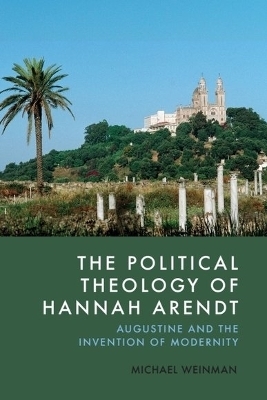
The Political Theology of Hannah Arendt
Augustine and the Invention of Modernity
Seiten
2025
Edinburgh University Press (Verlag)
978-1-3995-2554-1 (ISBN)
Edinburgh University Press (Verlag)
978-1-3995-2554-1 (ISBN)
- Noch nicht erschienen (ca. April 2025)
- Versandkostenfrei
- Auch auf Rechnung
- Artikel merken
Challenges the consensus that depicts Hannah Arendt as a secular thinker.
The Political Theology of Hannah Arendt clarifies how to understand Arendt's arguments about freedom, collective action, and the problem of evil as political theological, rather than political theoretical or philosophical. To achieve this, Weinman offers a comparative reading of Arendt's engagement with Augustine, from her 1929 dissertation through to The Life of the Mind, which she was working on when she died in 1975. Weinman's innovation is to not only read both works together, but to also read them in light of Arendt's discussion of Augustine in key passages taken from all her works written in the decades between them. Arendt's attempt to reconcile liberal commitments with the Augustinian tradition makes clear why Arendt-and not Carl Schmitt-ought to be read as offering the preeminent response to Max Weber's theory of modernity as inescapably secular, the result of irreversible processes of disenchantment.
The Political Theology of Hannah Arendt clarifies how to understand Arendt's arguments about freedom, collective action, and the problem of evil as political theological, rather than political theoretical or philosophical. To achieve this, Weinman offers a comparative reading of Arendt's engagement with Augustine, from her 1929 dissertation through to The Life of the Mind, which she was working on when she died in 1975. Weinman's innovation is to not only read both works together, but to also read them in light of Arendt's discussion of Augustine in key passages taken from all her works written in the decades between them. Arendt's attempt to reconcile liberal commitments with the Augustinian tradition makes clear why Arendt-and not Carl Schmitt-ought to be read as offering the preeminent response to Max Weber's theory of modernity as inescapably secular, the result of irreversible processes of disenchantment.
| Erscheint lt. Verlag | 30.4.2025 |
|---|---|
| Zusatzinfo | Illustrations |
| Verlagsort | Edinburgh |
| Sprache | englisch |
| Maße | 156 x 234 mm |
| Themenwelt | Geisteswissenschaften ► Philosophie ► Ethik |
| Geisteswissenschaften ► Philosophie ► Philosophie Altertum / Antike | |
| Sozialwissenschaften ► Politik / Verwaltung ► Politische Theorie | |
| ISBN-10 | 1-3995-2554-9 / 1399525549 |
| ISBN-13 | 978-1-3995-2554-1 / 9781399525541 |
| Zustand | Neuware |
| Haben Sie eine Frage zum Produkt? |
Mehr entdecken
aus dem Bereich
aus dem Bereich
unsere kollektive Verantwortung
Buch | Hardcover (2023)
wbg Theiss in Wissenschaftliche Buchgesellschaft (WBG) (Verlag)
CHF 46,90


